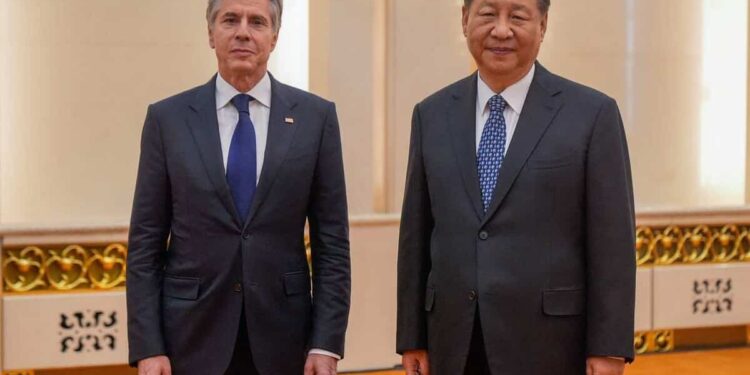Chinese President Xi Jinping told US Secretary of State Antony Blinken on Friday that the two countries should “be partners, not rivals” even though “many issues” still remained to be resolved.
• Read also: TikTok’s parent company does not intend to sell the application despite the American ultimatum
• Read also: Blinken in China: here’s why relations between Beijing and Washington remain tense
Since Wednesday, Antony Blinken has been making his second visit to China in less than a year. During his official meetings, he discussed several issues where the two countries have differences, such as Russia, Taiwan and trade.
Welcoming the head of American diplomacy to the Hall of the People in Beijing, Xi Jinping declared that the two countries had “made progress” since his meeting with his counterpart Joe Biden in November, according to public television CCTV.
“The two countries should be partners, not rivals” even if “many problems still need to be resolved and further efforts are still possible,” said Mr. Xi.
“We hope that the United States can also take a positive view of China’s development,” added the Chinese president. “When this fundamental problem is resolved … relations can truly stabilize, improve and move forward.”
Earlier in the day, Chinese Foreign Minister Wang Yi warned Antony Blinken that multiple US pressures on China could lead to a “deterioration” of ties between the two countries.
The head of Chinese diplomacy recalled that the question of Taiwan, an island of 23 million inhabitants claimed by Beijing and militarily supported by Washington, was the “first red line not to be crossed” in Sino-American relations.
The TikTok case
For his part, Antony Blinken described his more than five and a half hours of discussions with Wang Yi in the Diaoyutai diplomatic complex, surrounded by gardens, as “in-depth and constructive”.
The secretary of state is scheduled to meet with the press Friday evening at the U.S. Embassy in Beijing.
China criticizes the United States for its multiple pressures concerning the South China Sea, Taiwan, trade or its relations with Russia, which have strengthened since the invasion of Ukraine in February 2022.
Beijing is also standing up against American restrictions on exports to China of advanced technologies, including semiconductors.
Another more recent subject of friction: the social network TikTok is threatened with a ban in the United States if it does not cut its ties with its Chinese parent company ByteDance.
Washington says it suspects the application is used to spy on Americans, collect personal information and also serve Chinese propaganda. TikTok categorically denies these allegations.
Despite these tensions, relations between the two powers “are starting to stabilize” since the Xi-Biden summit in November, said Wang Yi, warning however against the persistence of “negative elements”.
“China’s legitimate development rights have been unduly oppressed and our fundamental interests are being challenged,” Wang said, referring to US restrictions in the technology sector.
“Calculation errors”
“Should China and the United States continue to move in the right direction of stability, or return to that of deterioration?” he pretended to wonder.
For his part, Antony Blinken expressed to Wang Yi his concerns about China’s alleged support “for the Russian defense industrial base,” said US State Department spokesperson Matthew Miller.
If Chinese companies do not directly supply weapons to Russia, Washington accuses them of delivering dual-use equipment and technologies to this country which facilitate its rearmament effort.
The United States and China must be as “clear as possible in the areas in which we have differences, at least to avoid misunderstandings and miscalculations,” the US secretary of state said.
Antony Blinken’s trip to China is a sign of a relative decline in friction between Beijing and Washington, exacerbated under former US President Donald Trump.
The latter once again promises a hard line against China if he wins the presidential election in November.
While seeking greater stability between the world’s two largest economies, Joe Biden seeks to maintain pressure on the Asian giant.



